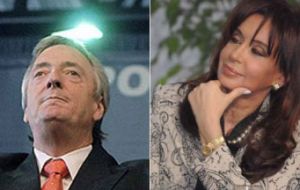MercoPress. South Atlantic News Agency
The Economist: the glass empties for the Kirchners
 The Kirchners turned the election into a plebiscite on their economic policies
The Kirchners turned the election into a plebiscite on their economic policies Recession and political mistakes by the first couple point to a change in the balance of power. But will Argentina at last acquire a more coherent opposition?
Until about three months ago, as the southern-hemisphere summer drew to a close, Argentines had expected an autumn of relative calm. Then President Cristina Fernández de Kirchner, who governs with her husband and predecessor, Néstor Kirchner, suddenly decided to bring forward to June 28th a mid-term legislative election that was not due until October. The switch prompted a flurry of fund-raising from across the political spectrum. “This time there’s a chance of a return on any investment,” says Nicolás Ducoté, a political analyst. After six years in which the Kirchners have had Argentine politics in their grip, change is in the now-wintry air.
Polls suggest that the first couple will lose their majority in the Lower House of Congress, where half the seats are up for election. Mr. Kirchner, who is standing in Buenos Aires province, is neck-and-neck with Francisco de Narváez, a businessman who heads a dissident group within the ruling Peronist movement. Mr. Kirchner will be elected, but a failure to beat Mr. de Narváez to the top of the poll in the province, home to 40% of the electorate and of the rustbelt suburbs that have been his main base, would be a humiliation.
During Mr. Kirchner’s presidential term, from 2003 to 2007, things went well. Spurred by high world prices for Argentina’s farm exports, the economy swiftly recovered from its collapse of 2001-02. Mr. Kirchner’s brutal debt restructuring helped at first (but the later failure to tie up the loose ends has not). The opposition was fragmented: Mr. Kirchner blamed the collapse on the policies of Carlos Menem, the president in the 1990s and leader of the Peronist right, and the Radicals were discredited by having failed to prevent it when in power. In 2007 Mrs. Kirchner was easily elected with 45% of the vote.
Hopes that she would be more moderate than her abrasive husband were quickly dashed. Having tried to raise taxes on agricultural exports to extortionate levels, she turned the resulting dispute with angry farmers into a trial of strength which she lost. She seems to share her husband’s antipathy to private business, nationalizing an airline and criticizing Techint, a big steel-products group. Meanwhile, the global recession hit Argentina’s economy.
The Kirchners’ decision to turn the election into a plebiscite on their economic policies looks ham-fisted, since two-thirds of respondents now disapprove of these, according to Poliarquía, a pollster. Although export prices are improving and there are signs that the recession may be relatively short, unemployment could be Mr. Kirchner’s undoing. In some suburbs of Buenos Aires it has climbed to 17%; in such places over 40% of people are now poor, the highest figure since 2002. Crime, another worry, has risen under the Kirchners, although it is still low compared with many other South American countries.
All this has made Mrs. Kirchner unpopular and galvanized the private sector, the Peronist right and the opposition in a campaign that has largely been free of policy debate and packed with dirty tricks. Mr de Narváez has drawn on his own fortune in his battle to beat Mr. Kirchner, plastering Buenos Aires province with bus-sized posters of himself.
Mr. Kirchner, who heads the Peronist movement, has resorted to artifice. He has tartered up his list of candidates with some 40 mayors and the province’s governor, even though few are likely to take up congressional seats. He has used the presidential helicopter for many campaign trips. Many Argentines see his hand in an attempt by a much-questioned judge to link Mr. de Narváez to a suspected smuggler (although there is no direct evidence of that).
Nowadays the Kirchners have few friends in the media. They are mercilessly pilloried on “Gran Cuñada”, a satirical campaign version of “Big Brother”. Mr. de Narváez owns a newspaper and a television channel. But he has also quietly built a political base, organizing grass-roots discussion groups in the aftermath of the 2001-02 economic crisis.
Since he was born in Colombia, Mr. de Narváez is barred from ever running for president. But thanks partly to his efforts power look likely to swing back towards the Peronist right. The Radical party still suffers from splits and a shortage of cash, although its leaders hope this month’s vote will mark the start of their recuperation. A poor result for the Kirchners would mean that the presidential poll in two years’ time would be wide open. And depending on Mrs. Kirchner reaction, it could usher in either more business-friendly economic policies, or two years of rising confrontation




Top Comments
Disclaimer & comment rulesCommenting for this story is now closed.
If you have a Facebook account, become a fan and comment on our Facebook Page!